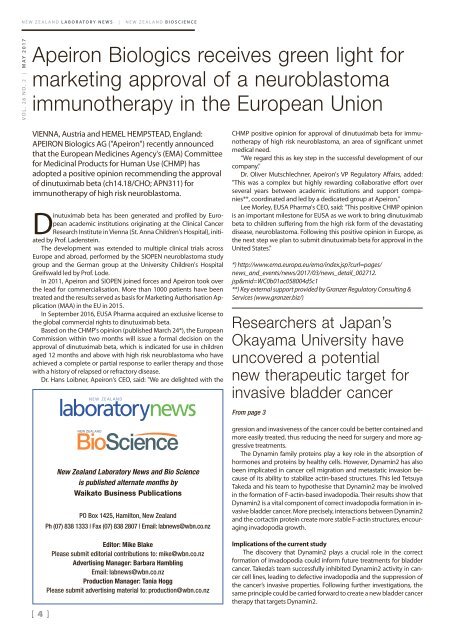Laboratory News & BioScience May 2017
New Zealand's leading scientific publication for more than 20 years. This bi-monthly magazine provides the latest up to date information on new products and services to a readership which is carefully targeted and updated on a regular basis.
New Zealand's leading scientific publication for more than 20 years. This bi-monthly magazine provides the latest up to date information on new products and services to a readership which is carefully targeted and updated on a regular basis.
- No tags were found...
Create successful ePaper yourself
Turn your PDF publications into a flip-book with our unique Google optimized e-Paper software.
NEW ZEALAND LABORATORY NEWS | NEW ZEALAND BIOSCIENCE<br />
VOL. 26 NO. 2 | MAY <strong>2017</strong><br />
Apeiron Biologics receives green light for<br />
marketing approval of a neuroblastoma<br />
immunotherapy in the European Union<br />
VIENNA, Austria and HEMEL HEMPSTEAD, England:<br />
APEIRON Biologics AG ("Apeiron") recently announced<br />
that the European Medicines Agency's (EMA) Committee<br />
for Medicinal Products for Human Use (CHMP) has<br />
adopted a positive opinion recommending the approval<br />
of dinutuximab beta (ch14.18/CHO; APN311) for<br />
immunotherapy of high risk neuroblastoma.<br />
Dinutuximab beta has been generated and profiled by European<br />
academic institutions originating at the Clinical Cancer<br />
Research Institute in Vienna (St. Anna Children's Hospital), initiated<br />
by Prof. Ladenstein.<br />
The development was extended to multiple clinical trials across<br />
Europe and abroad, performed by the SIOPEN neuroblastoma study<br />
group and the German group at the University Children's Hospital<br />
Greifswald led by Prof. Lode.<br />
In 2011, Apeiron and SIOPEN joined forces and Apeiron took over<br />
the lead for commercialisation. More than 1000 patients have been<br />
treated and the results served as basis for Marketing Authorisation Application<br />
(MAA) in the EU in 2015.<br />
In September 2016, EUSA Pharma acquired an exclusive license to<br />
the global commercial rights to dinutuximab beta.<br />
Based on the CHMP's opinion (published March 24*), the European<br />
Commission within two months will issue a formal decision on the<br />
approval of dinutuximab beta, which is indicated for use in children<br />
aged 12 months and above with high risk neuroblastoma who have<br />
achieved a complete or partial response to earlier therapy and those<br />
with a history of relapsed or refractory disease.<br />
Dr. Hans Loibner, Apeiron's CEO, said: "We are delighted with the<br />
[ 4 ]<br />
NEW ZEALAND<br />
laboratorynews<br />
New Zealand <strong>Laboratory</strong> <strong>News</strong> and Bio Science<br />
is published alternate months by<br />
Waikato Business Publications<br />
PO Box 1425, Hamilton, New Zealand<br />
Ph (07) 838 1333 | Fax (07) 838 2807 | Email: labnews@wbn.co.nz<br />
Editor: Mike Blake<br />
Please submit editorial contributions to: mike@wbn.co.nz<br />
Advertising Manager: Barbara Hambling<br />
Email: labnews@wbn.co.nz<br />
Production Manager: Tania Hogg<br />
Please submit advertising material to: production@wbn.co.nz<br />
CHMP positive opinion for approval of dinutuximab beta for immunotherapy<br />
of high risk neuroblastoma, an area of significant unmet<br />
medical need.<br />
“We regard this as key step in the successful development of our<br />
company."<br />
Dr. Oliver Mutschlechner, Apeiron's VP Regulatory Affairs, added:<br />
"This was a complex but highly rewarding collaborative effort over<br />
several years between academic institutions and support companies**,<br />
coordinated and led by a dedicated group at Apeiron."<br />
Lee Morley, EUSA Pharma's CEO, said: "This positive CHMP opinion<br />
is an important milestone for EUSA as we work to bring dinutuximab<br />
beta to children suffering from the high risk form of the devastating<br />
disease, neuroblastoma. Following this positive opinion in Europe, as<br />
the next step we plan to submit dinutuximab beta for approval in the<br />
United States."<br />
*) http://www.ema.europa.eu/ema/index.jsp?curl=pages/<br />
news_and_events/news/<strong>2017</strong>/03/news_detail_002712.<br />
jsp&mid=WC0b01ac058004d5c1<br />
**) Key external support provided by Granzer Regulatory Consulting &<br />
Services (www.granzer.biz/)<br />
Researchers at Japan’s<br />
Okayama University have<br />
uncovered a potential<br />
new therapeutic target for<br />
invasive bladder cancer<br />
From page 3<br />
gression and invasiveness of the cancer could be better contained and<br />
more easily treated, thus reducing the need for surgery and more aggressive<br />
treatments.<br />
The Dynamin family proteins play a key role in the absorption of<br />
hormones and proteins by healthy cells. However, Dynamin2 has also<br />
been implicated in cancer cell migration and metastatic invasion because<br />
of its ability to stabilize actin-based structures. This led Tetsuya<br />
Takeda and his team to hypothesise that Dynamin2 may be involved<br />
in the formation of F-actin-based invadopodia. Their results show that<br />
Dynamin2 is a vital component of correct invadopodia formation in invasive<br />
bladder cancer. More precisely, interactions between Dynamin2<br />
and the cortactin protein create more stable F-actin structures, encouraging<br />
invadopodia growth.<br />
Implications of the current study<br />
The discovery that Dynamin2 plays a crucial role in the correct<br />
formation of invadopodia could inform future treatments for bladder<br />
cancer. Takeda’s team successfully inhibited Dynamin2 activity in cancer<br />
cell lines, leading to defective invadopodia and the suppression of<br />
the cancer’s invasive properties. Following further investigations, the<br />
same principle could be carried forward to create a new bladder cancer<br />
therapy that targets Dynamin2.


















